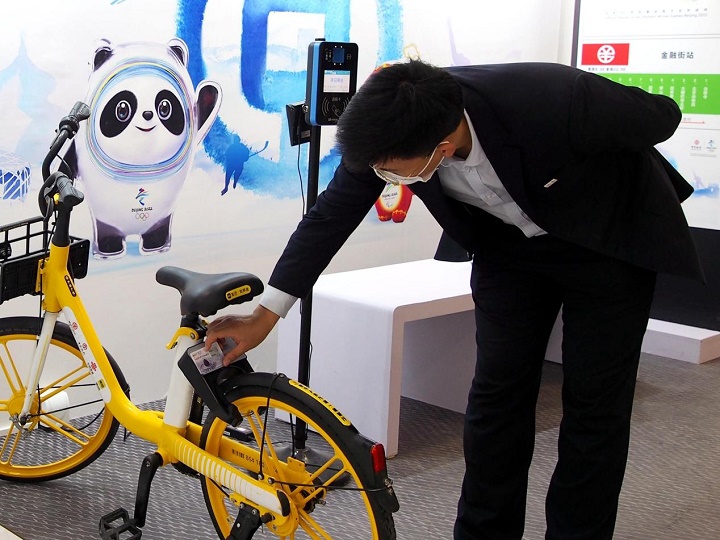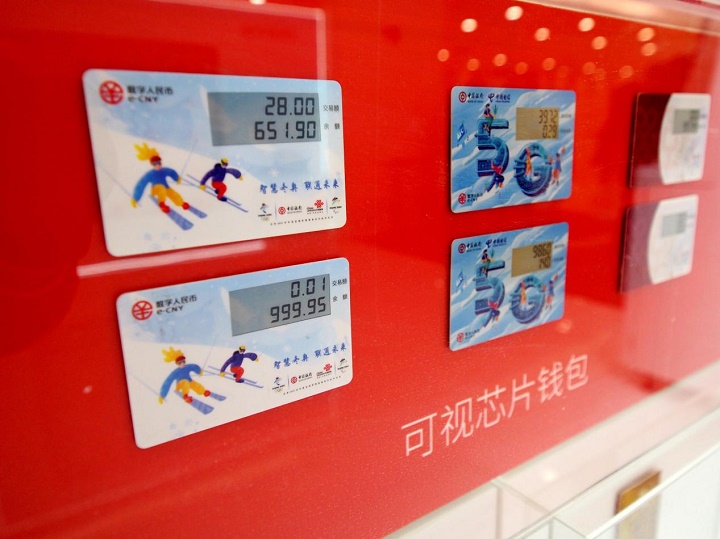
By Wu Qiuyu, People’s Daily
China has rolled out a broad range of payment products to help both Chinese citizens and foreigners experience the convenience of mobile payment with China’s digital fiat currency, or the e-CNY, for small-value payments during the 2022 Olympic and Paralympic Winter Games.
During the just-concluded Beijing 2022 Winter Olympics, many people used digital yuan to buy Bing Dwen Dwen, the official mascot of the sports event, from a store selling Beijing 2022 licensed merchandise at the National Stadium in Beijing.
The Beijing 2022 Winter Olympics is the epitome of the pilot programs of the digital yuan. Over the past few years, the country has launched the trial run of its digital currency in Hainan province, Xiong’an New Area, eight cities including Shenzhen, Suzhou, Chengdu, Shanghai, Changsha, Xi’an, Qingdao, and Dalian, as well as competition zones of the 2022 Winter Olympics in Beijing and Zhangjiakou, the co-host city for the Games.

Data showed that as of the end of 2021, the number of pilot scenarios of the e-CNY reached about 8.09 million, and the cumulative digital yuan transactions hit 87.57 billion yuan ($13.78 billion).
Pilot areas of the digital currency have effectively verified the technical design and the stability of systems for digital yuan payment services, the usability of relevant payment products, and the applicability to different scenarios, enhancing people’s understanding of the design concept of the e-CNY.
At the beginning of this year, a pilot version of the digital yuan wallet mobile app was made available on multiple app stores. As the pilot projects of digital yuan are advanced, relevant products and application scenarios have been increasingly enriched.
During the 2022 Olympic and Paralympic Winter Games, for instance, consumers can choose to pay either through the digital yuan wallet mobile app or various forms of physical wallet of digital Chinese yuan, including payment cards and wristbands.
The physical wallets of the e-CNY, which can be obtained and used anonymously for small-value payments, are safe and convenient and can ensure the security of users’ personal data.
China will promote research and development of its digital fiat currency in a steady manner, according to the country’s economic and social development blueprint, the Outline of the 14th Five-Year Plan (2021-2025) for National Economic and Social Development and the Long-Range Objectives Through the Year 2035.
At present, the digital economy is becoming an increasingly important driving force for global economic growth, pointed out Pan Helin, executive director of the digital economy research institute of Zhongnan University of Economics and Law.
The research, development, and application of digital renminbi (RMB) can help better fulfill people’s demands for fiat currency in digital economy scenarios and improve the convenience and security of retail payments, propelling the development of China’s digital economy, Pan explained.
The research and development of digital RMB is a necessity for facilitating the growth of the digital economy, noted Fan Yifei, deputy governor of the People’s Bank of China (PBOC), China’s central bank.
Sci-tech innovations represented by the digital economy are growing into a key driving force for the cultivation of new growth drivers, Fan noted, adding that to achieve high-quality economic and social development, China needs to develop a new type of retail payment infrastructure, a public product that is safer, all-purpose, and inclusive, so as to further satisfy people’s diverse payment demands and improve the capacity and efficiency of basic financial services.
The central bank will continue promoting pilot programs and the research and development of the digital yuan, and further deepen pilot use of e-CNY in retail services, living payment, government services, and other scenarios according to the arrangements of the Outline of the 14th Five-Year Plan (2021-2025) for National Economic and Social Development and the Long-Range Objectives Through the Year 2035, according to an official with the PBOC.










